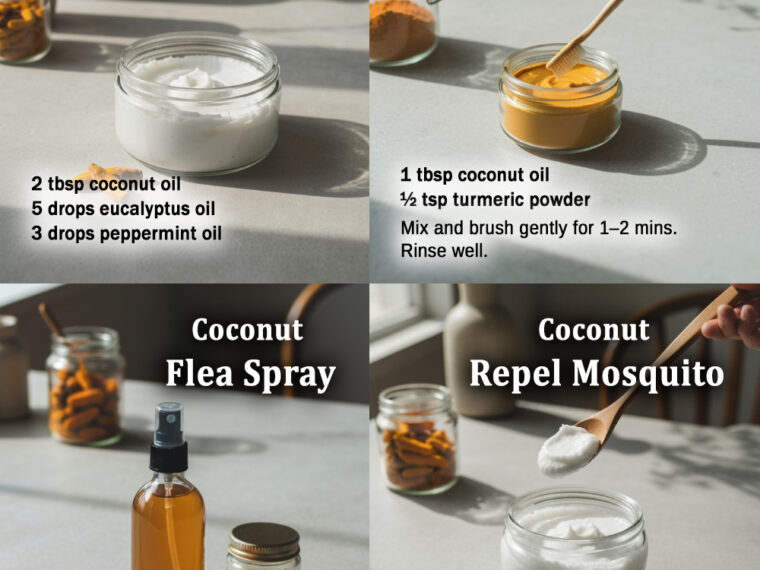- Minor cuts and scrapes: Apply a thin layer to protect the skin and prevent infection.
- Sunburn relief: Mix with aloe vera gel for a soothing after-sun treatment.
- Insect bites: Coconut oil can help reduce itchiness and redness from mosquito bites.
Its fatty acids, particularly lauric acid, disrupt the cell membranes of harmful bacteria, making it a mild natural antiseptic.
6. Household Uses: Beyond the Body
Coconut oil is not limited to personal care. Its versatility extends into household tasks, offering natural and chemical-free alternatives.
Creative Uses:
- Furniture polish: Mix coconut oil with a few drops of lemon juice to clean and shine wooden surfaces.
- Stuck drawers: Rub a small amount along tracks and hinges to ease movement.
- Leather conditioner: Keep shoes, bags, and jackets soft and supple.
- Rust prevention: Apply a thin coat to metal tools to protect against corrosion.
These simple uses demonstrate how a single natural product can replace multiple specialized household items.
7. Wellness and Lifestyle: Energize Your Day
Beyond practical uses, coconut oil supports overall wellness. Its medium-chain triglycerides (MCTs) are quickly absorbed and converted into energy, making it a popular choice among athletes, busy professionals, and those following ketogenic diets.
Lifestyle Applications:
- Pre-workout fuel: A teaspoon of coconut oil can provide sustained energy without heavy digestion.
- Boosting metabolism: Some studies suggest MCTs may slightly increase energy expenditure, supporting healthy metabolism.
- Mood and focus: Certain fatty acids in coconut oil are linked to improved cognitive function, especially in older adults.
While not a miracle food, coconut oil can complement a healthy diet and active lifestyle.
8. Choosing the Right Coconut Oil
Not all coconut oils are created equal. Quality matters for both culinary and cosmetic purposes.
Tips for Selection:
- Virgin or extra-virgin: Cold-pressed oils retain more nutrients and aroma, ideal for skincare and cooking.
- Refined coconut oil: Neutral in taste and higher smoke point, better for high-heat cooking.
- Organic: Minimizes exposure to pesticides and chemical residues.
Storage:
- Keep in a cool, dark place to preserve freshness.
- Solid at room temperature in cooler climates; melts around 76°F (24°C).
- Avoid plastic containers for long-term storage to prevent chemical leaching.
9. Practical Tips for Daily Use
To fully enjoy coconut oil’s versatility, consider integrating it into daily routines:
- Morning: Add to coffee, tea, or a smoothie.
- Afternoon: Massage into hands or lips for hydration.
- Evening: Apply as a hair mask or skin moisturizer before bed.
Consistency matters more than quantity. A little goes a long way, and gradual incorporation avoids skin or digestive issues for those with sensitive reactions.
10. Sustainability and Ethical Considerations
With the growing popularity of coconut oil, sustainability has become an important factor. Ethical sourcing ensures that coconut farmers are fairly compensated and that environmental impacts are minimized.
- Look for Fair Trade certification.
- Choose organic options that avoid chemical fertilizers and pesticides.
- Support brands that engage in responsible harvesting practices.
Being mindful about sourcing helps preserve tropical ecosystems and supports communities where coconuts are grown.
11. Coconut Oil Myths and Misconceptions
Despite its popularity, coconut oil is sometimes misunderstood. Here are some common myths debunked:
- Myth 1: Coconut oil is unhealthy because it’s saturated fat.
Truth: Its unique MCTs are metabolized differently than long-chain saturated fats and can fit into a balanced diet when consumed in moderation. - Myth 2: Coconut oil clogs pores for everyone.
Truth: While it can be comedogenic for oily or acne-prone skin, it’s beneficial for dry or sensitive skin. Patch testing is recommended. - Myth 3: It’s a miracle weight-loss product.
Truth: Coconut oil may support metabolism modestly but isn’t a magic solution. It works best as part of a healthy diet and lifestyle.
Understanding the facts allows you to use coconut oil safely and effectively without unrealistic expectations.
12. DIY Coconut Oil Recipes
Here are a few simple DIY projects to maximize coconut oil’s potential:
1. Coconut Sugar Scrub:
- 2 tbsp coconut oil
- 2 tbsp brown sugar
- Mix and use to exfoliate dry skin in the shower.
2. Hair Shine Serum:
- 1 tsp coconut oil
- A few drops of argan or jojoba oil
- Rub lightly on hair ends for shine and frizz control.
3. Lip Balm:
- 1 tsp coconut oil
- 1 tsp beeswax
- Melt, mix, and pour into small containers for a natural balm.
4. Body Lotion:
- 2 tbsp coconut oil
- 1 tbsp shea butter
- 5 drops essential oil (lavender or peppermint)
- Whip until creamy and store in a jar.
These DIY creations showcase how a single natural ingredient can replace multiple commercial products.
13. Final Thoughts
Coconut oil is more than just a tropical flavoring; it’s a true multitasker for the kitchen, bathroom, and beyond. From nourishing the skin and hair to enhancing culinary creations and supporting wellness, its uses are practically limitless.
The key to success is quality, moderation, and creativity. By integrating coconut oil thoughtfully into your lifestyle, you can enjoy its many benefits while embracing a natural, sustainable, and versatile approach to daily living.
Whether you’re drizzling it on pancakes, massaging it into your cuticles, or adding it to your hair mask, coconut oil proves that some natural products truly deserve a permanent place in your home. 🥥✨





